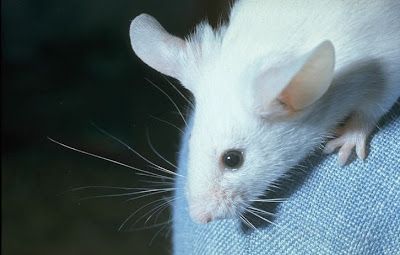Food for fancy mice is relatively inexpensive. Veterinarians generally recommend a product called lab block, a scientifically-formulated blend originally designed for mice in laboratories.
Dry dog food is another good option when lab block is unavailable, as it offers balanced nutrition for a mouse and helps keep their teeth conditioned. Special mouse food found in pet stores also makes a good diet. In order to keep variety in their diets, mice can also eat oats, oily seeds, clean egg shell breakfast cereal, and stale bread. Fruit and vegetables can be offered occasionally. They should also have clean water at all times and some sort of chewing wood in order to keep their teeth from growing too long. Wood found
outdoors may not be safe, but many products
are available from pet stores to satisfy the chewing instinct.





